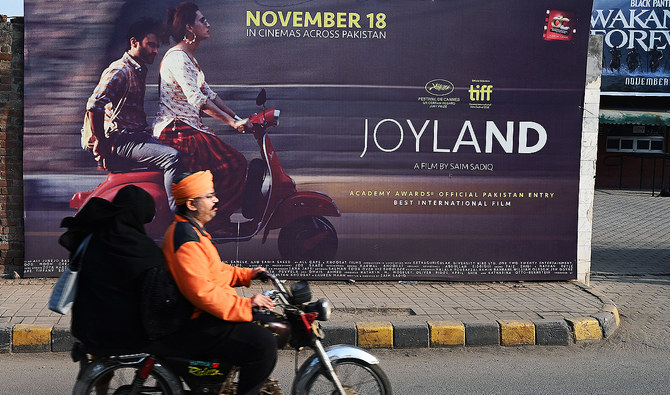ISLAMABAD: Transgender persons are equal citizens of Pakistan and deserve equal space and recognition, while Islam, being a great global religion, was strong enough to withstand a cinematic work, a Pakistani court ruled on Saturday, dismissing a plea seeking a ban on the country’s 2023 Oscar entry film “Joyland.”
Joyland celebrates “transgender culture” in Pakistan and the story revolves around a family torn between modernity and tradition in contemporary Lahore.
The film has won the Cannes “Queer Palm” prize for the best feminist-themed movie as well as the Jury Prize in the “Un Certain Regard” competition, a segment focusing on young, innovative cinema talent. It is Pakistan’s entry for next year’s Academy Awards.
A petition filed in the Sindh High Court (SHC) earlier this week sought a ban on the film, maintaining that its release in the South Asian country was a “conspiracy” that would create chaos in society.
In its detailed verdict, an SHC bench, comprising Chief Justice Ahmed Ali Sheikh and Justice Yousuf Ali Sayeed, observed that unnecessary censorship suffocates a society and stifles its creativity and growth.
“Looking to the matter at hand, we are confident that Islam, being the great global religion that it is, is strong enough to withstand a cinematic work portraying a purely fictional account of a relationship humanizing a transgender character, and are equally sanguine that our society is not so weak as to crumble as a consequence,” the court ruled.
“Transgender persons are equal citizens of Pakistan in all respects and the stories of their life, their struggles, and their human relationships deserve equal space and recognition.”
'Joyland' has been the center of discussions in Pakistan in recent weeks after the government revoked its censor certificate days before the film’s release this month.
A special committee, set up by Prime Minister Shehbaz Sharif, last week suggested a full-board review of the film and the movie was finally cleared for release a day before the scheduled date, with some cuts.
The SHC order said the petitioner did not point out any legal flaw or procedural lapse in the certification process and merely sought to argue that the theme and content of the work offended the constitution. While the petitioner presented many articles, but they did not make any attempt to show how any articles would be violated by the screening of the film, it added.
In their view, the judges said, where a cinematic work had passed through the censors, which had examined its content and cleared it for release with an appropriate certification, an individual could not be allowed to trump that decision through a court proceeding based on their conception of morality.
“Indeed, it is not the function of the court under Article 199 to make a moral judgment so as to curtail the freedom of speech and expression of a filmmaker, as safeguarded under Article 19 of the constitution,” the verdict read.
In the absence of any restriction imposed by the concerned quarter, the court ruled, it did not fall under its domain to morally police the public by making a determination of what should or should not be viewed and to take on the function of itself devising and imposing a restriction.
“Suffice it to say that unnecessary censorship suffocates a society and stifles its creativity and growth,” it added.
“It is for the foregoing reasons that we had dismissed the petition in line vide a short order made in court upon culmination of the hearing on November 22.”
















